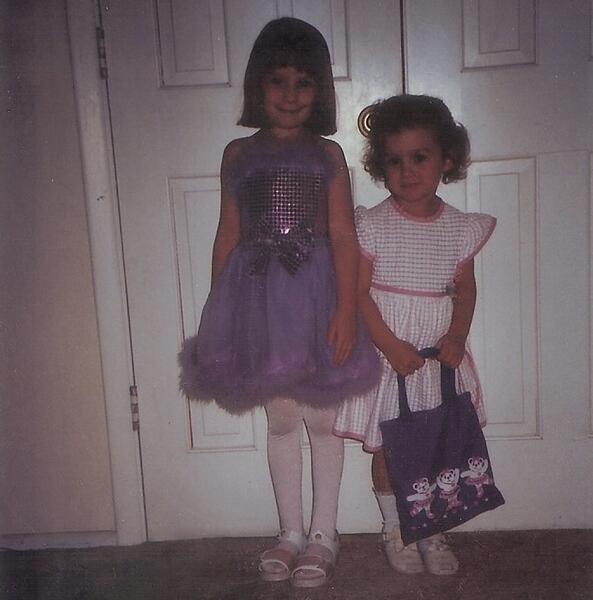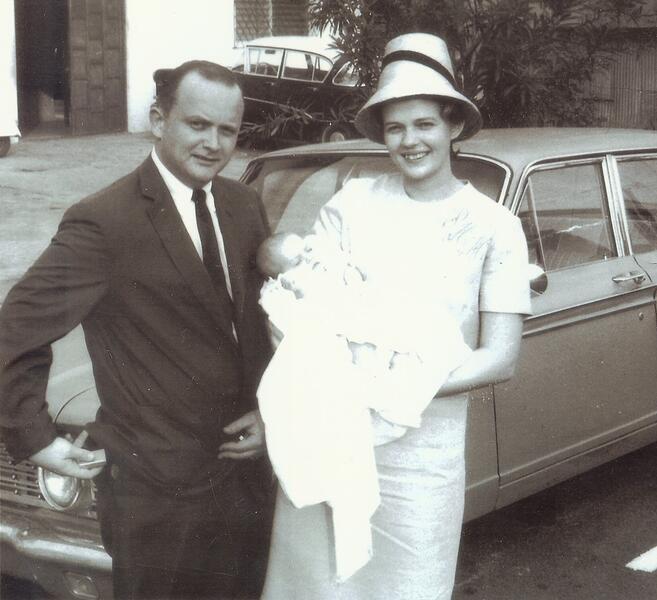About Katherine
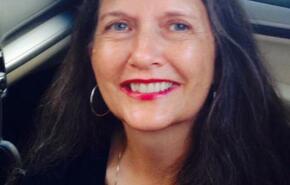
October 6, 2016: My two books of poetry are Island and Living Room (prose poems). My third book, My CIA, is a lyric essay/memoir. My CIA was named a top ten book of 2012 by the Review of Art, Literature, Philosophy and Humanities and added to their ongoing list of great nonfiction reads. It won a Baker Artist Award; was showcased on Maryland Public Television’s, An Artworks Special; and was featured through an art installation co-… more
Jump to a project:
ISLAND
"[Katherine McCord] is a remarkable poet whose work is certain and hesitant at once, compressed and expansive. She wants silence to speak as carefully as her words. She sees poetry in the purest sense, working toward pieces where important things aren't merely described or reported but transformed. Katherine McCord is an artist, through and through, taking aspects of ordinary life and finding fear and wonder in them." --Marianne Boruch
"The pared inscription, as well as the delicacy and discretion, of Katherine McCord's debut collection, ISLAND, are always deeply compelling and often breathtaking. The honorable simplicity of this work rewards us time and time again with both wisdom and delight. Quietly elegant, and as intimate as a whisper, this is a book to hold close in the silence of the night." --David St. John
Here again, what will follow will be a tiny bit of the book, the title poem, as I'm unable to get it to load on this site otherwise.
Katherine McCord
Island
Flying over a sea
she thinks of him.
How it’s between her and God,
this man who empties her
mid-air.
He’s everything, isn’t he?
The distant?
Those gone?
The subdued island of people she doesn’t know.
When she eats it’s his food.
When she disappears, she loses his things,
his clothes.
She’s done it now
coming here alone
without her passport
to live the life of a woman
he’d love.
"The pared inscription, as well as the delicacy and discretion, of Katherine McCord's debut collection, ISLAND, are always deeply compelling and often breathtaking. The honorable simplicity of this work rewards us time and time again with both wisdom and delight. Quietly elegant, and as intimate as a whisper, this is a book to hold close in the silence of the night." --David St. John
Here again, what will follow will be a tiny bit of the book, the title poem, as I'm unable to get it to load on this site otherwise.
Katherine McCord
Island
Flying over a sea
she thinks of him.
How it’s between her and God,
this man who empties her
mid-air.
He’s everything, isn’t he?
The distant?
Those gone?
The subdued island of people she doesn’t know.
When she eats it’s his food.
When she disappears, she loses his things,
his clothes.
She’s done it now
coming here alone
without her passport
to live the life of a woman
he’d love.
-
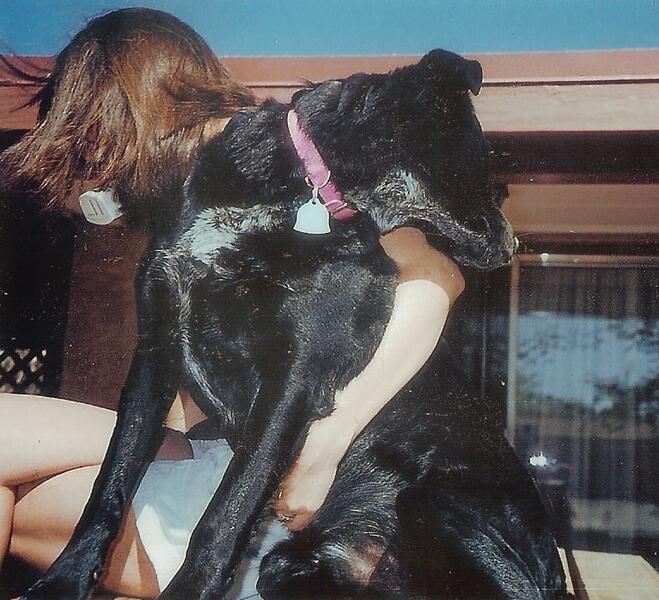 Flower, meThis is a picture of me, and our beloved dog, Flower, taken by one of my girls!--we can't remember which--and she would have been only 3 or 5 or so!--during the time I was finalizing ISLAND. The picture says everything. I'm outside with my girls in New Mexico (yay!), I'm "holding" the dog, talking on the phone, and they are running around playing. :)
Flower, meThis is a picture of me, and our beloved dog, Flower, taken by one of my girls!--we can't remember which--and she would have been only 3 or 5 or so!--during the time I was finalizing ISLAND. The picture says everything. I'm outside with my girls in New Mexico (yay!), I'm "holding" the dog, talking on the phone, and they are running around playing. :)
LIVING ROOM: A Year in the Life of a Writing Mother
Katherine McCord's moving sequence of prose poems, LIVING ROOM, expresses truthfully and with poignant, even painful clarity the trials and triumphs of a life claimed by conflicting loves: love of writing, love of husband and children. She gives us a year of this life, and it is a privilege to experience it through her evocative, passionate language. --Kelly Cherry
Katherine McCord explodes triumphantly onto the poetry scene with her newest collection of prose poems written over the course of a year. She writes with fevered delicacy as she details her daily struggles with conflicting passions often at odds with one another: writing and family. She writes of "days lost" and "the sick feeling I'd been given too much" from her entry on June 6th to "The fear first and foremost that I can't do it, that I can't write anything worth anything today" from June 7th.
Her first entry reveals that: "It's the same for me, being a mother and writing. I live in the existence of being forever in love with the irreparable inescapable acts. I'm good at both. I'm lousy at both." McCord writes with poignant clarity and truth as she exposes her perilous relationship with the blank page each day: "Greta asks me if she'll ever have to have another blood test. She knows I don't know. I say, holding her, you're probably done." And then "I suppose none of us knew the difference between each others' pain." From July 23rd. She infuses the activities of daily living and all that entails with the blank page and offers us an astounding package. This is the work of a mature, talented writer who integrates her personal amazement at the details of daily life with the inescapable act of being an artist
It is brave and daring writing when the poet bares her soul and shows up with the naked truth of her journey: "You see, I'm atop my favorite desert city, out the window, just lights and stars." From August 3rd. On August 5th she discusses her teaching experiences and offers: "How do I explain? Students, while lovely, can sometimes be cruel. Or every once in a while there's one who rears up from the center of the class, cruel. She can't help it. In class I don't react. That's what you get, I suppose, for teaching what's at the core of your life. No less than asking for comments on a beating heart."
On August 6th she confesses "Of course these entries almost always begin with long narratives, in long hand, on the page. Then I go to the heart of them and pull out the truth - often a line or phrase and begin there." On August 7th she writes: "The truth is I've learned to love without success. I've watched so many people reach old age without it. In my youth, success was something glamorous, ... It flew above us like the sheer streaks of a plane. In my life, I've reconciled glamour. I want art" ... On the same day she writes of her daughters: "Right now - the oldest especially - they seem outraged. They are already living a woman's life." Sometime during the time period from August 9 - 11 she shares: "As a child I had a knack for getting people mad at my silence."
Reading this book of prose poems is to bear witness to the transformation of the artist from bud to flowering blossom. This is sobering work. Herein are the moving lyrics of a life told in verse and, as such, a poetic autobiography. It is deeply compelling work that speaks to the artist's method and madness with delicious effect. McCord gives us a year of her life and it is a privilege to experience it through her passionate language. She is an artist through and through.
Reviewed by Jeanie C. Williams
Again, what follows will be an excerpt from the book. I'm unable to get it to load elsewhere through this site.
Katherine McCord
Living Room
August 30th
Late at night, a child next to me in bed, I’m dreaming I’m standing in grief’s house. He’s before me, calling me babe, a cigarette in his hand, my other daughter’s rainbow above us, framed, perpendicular to the flowered ground, red blooms that glow, a yellow and blue bird hung in the sky like a window or a heart.
September 4th
I’m not sure I want it to be fall. There’s a cool breeze. No one’s home. Late afternoon. I’m longing for something like you. The weekend has splayed out with its accidents and tolls. The top of my wrist heals from the burn of the dog’s leash. And my heart from watching in the dark blue hotel room with Tom a movie, Stigmata, while the girls slept behind us in bed and we huddled on the floor deeply engrossed after a day of wandering, questions, frustration, alone in a city we no longer belong to, having gone there for reprieve only to find that the highlight, the thing that would make the most sense was a deeply fictional movie we landed upon at random, a movie about a contemporary atheist bearing the wounds of god, a Christ who didn’t speak any of the words known. But what do I know? You are my witness. What do I know?
Between September 4th and 5th
Terrified I’m asleep, about to wake up an old woman having made wrong choice after wrong choice or having made no choice at all, I’m about to approach Tom: Do you think? Am I? I know what you’re going to say, Be careful. And I never wanted politics to enter in, at least knowingly. But you’re asking me. Children, children, I’m combing their hair and handing them over to Tom. Did you know I did that? Did you see the imprint of their blankets on my skin? Did you know how hard it was, each time, harder still, all so I could write, fall asleep on the half-written page, exhausted with grief?
Katherine McCord explodes triumphantly onto the poetry scene with her newest collection of prose poems written over the course of a year. She writes with fevered delicacy as she details her daily struggles with conflicting passions often at odds with one another: writing and family. She writes of "days lost" and "the sick feeling I'd been given too much" from her entry on June 6th to "The fear first and foremost that I can't do it, that I can't write anything worth anything today" from June 7th.
Her first entry reveals that: "It's the same for me, being a mother and writing. I live in the existence of being forever in love with the irreparable inescapable acts. I'm good at both. I'm lousy at both." McCord writes with poignant clarity and truth as she exposes her perilous relationship with the blank page each day: "Greta asks me if she'll ever have to have another blood test. She knows I don't know. I say, holding her, you're probably done." And then "I suppose none of us knew the difference between each others' pain." From July 23rd. She infuses the activities of daily living and all that entails with the blank page and offers us an astounding package. This is the work of a mature, talented writer who integrates her personal amazement at the details of daily life with the inescapable act of being an artist
It is brave and daring writing when the poet bares her soul and shows up with the naked truth of her journey: "You see, I'm atop my favorite desert city, out the window, just lights and stars." From August 3rd. On August 5th she discusses her teaching experiences and offers: "How do I explain? Students, while lovely, can sometimes be cruel. Or every once in a while there's one who rears up from the center of the class, cruel. She can't help it. In class I don't react. That's what you get, I suppose, for teaching what's at the core of your life. No less than asking for comments on a beating heart."
On August 6th she confesses "Of course these entries almost always begin with long narratives, in long hand, on the page. Then I go to the heart of them and pull out the truth - often a line or phrase and begin there." On August 7th she writes: "The truth is I've learned to love without success. I've watched so many people reach old age without it. In my youth, success was something glamorous, ... It flew above us like the sheer streaks of a plane. In my life, I've reconciled glamour. I want art" ... On the same day she writes of her daughters: "Right now - the oldest especially - they seem outraged. They are already living a woman's life." Sometime during the time period from August 9 - 11 she shares: "As a child I had a knack for getting people mad at my silence."
Reading this book of prose poems is to bear witness to the transformation of the artist from bud to flowering blossom. This is sobering work. Herein are the moving lyrics of a life told in verse and, as such, a poetic autobiography. It is deeply compelling work that speaks to the artist's method and madness with delicious effect. McCord gives us a year of her life and it is a privilege to experience it through her passionate language. She is an artist through and through.
Reviewed by Jeanie C. Williams
Again, what follows will be an excerpt from the book. I'm unable to get it to load elsewhere through this site.
Katherine McCord
Living Room
August 30th
Late at night, a child next to me in bed, I’m dreaming I’m standing in grief’s house. He’s before me, calling me babe, a cigarette in his hand, my other daughter’s rainbow above us, framed, perpendicular to the flowered ground, red blooms that glow, a yellow and blue bird hung in the sky like a window or a heart.
September 4th
I’m not sure I want it to be fall. There’s a cool breeze. No one’s home. Late afternoon. I’m longing for something like you. The weekend has splayed out with its accidents and tolls. The top of my wrist heals from the burn of the dog’s leash. And my heart from watching in the dark blue hotel room with Tom a movie, Stigmata, while the girls slept behind us in bed and we huddled on the floor deeply engrossed after a day of wandering, questions, frustration, alone in a city we no longer belong to, having gone there for reprieve only to find that the highlight, the thing that would make the most sense was a deeply fictional movie we landed upon at random, a movie about a contemporary atheist bearing the wounds of god, a Christ who didn’t speak any of the words known. But what do I know? You are my witness. What do I know?
Between September 4th and 5th
Terrified I’m asleep, about to wake up an old woman having made wrong choice after wrong choice or having made no choice at all, I’m about to approach Tom: Do you think? Am I? I know what you’re going to say, Be careful. And I never wanted politics to enter in, at least knowingly. But you’re asking me. Children, children, I’m combing their hair and handing them over to Tom. Did you know I did that? Did you see the imprint of their blankets on my skin? Did you know how hard it was, each time, harder still, all so I could write, fall asleep on the half-written page, exhausted with grief?
Muse Annie
Muse Annie is a sequence of poems that turns on a conversation the speaker is having with Annie, an other, a second self, anyone, everyone, that begins a short time after the death of her father. The prose poems, sometimes funny, sometimes dark ask everything of the artist, the writer, saying, It must be better, it must be more, it must be joy, in the end. Five, all five that I sent, were taken by and recently published in AMERICAN POETRY REVIEW. Ten were melded into a "story" by CAKETRAIN and published there. Many others have been published in various literary magazines and journals.
Ms. Karl's Blog
In the first frame on the left is a picture of an illustration I'm using to introduce Ms. Karl's Blog, a series of vignettes, blog style, I started at the request of my husband. I'd like to think the picture is of Ms. Karl somewhat. At least the drawing is in response to someone telling me as a child I was drawing wrong (nope, not a family member!). You see, my female characters were all in dresses, and their dresses were triangles. I immediately stopped drawing. But, hey, the triangles are back. :)
-
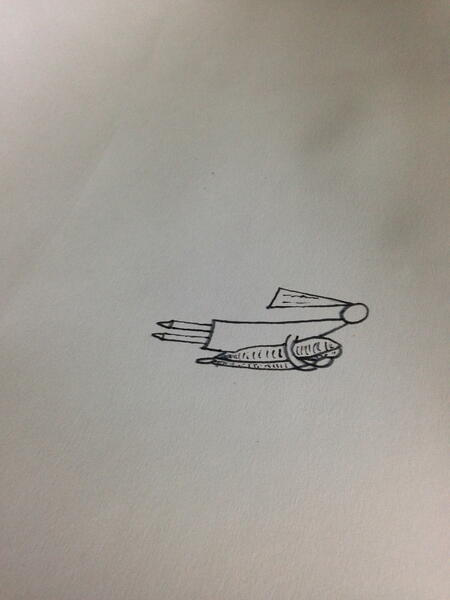 FlyingSo here is the image I described before. Here are a few excerpts from Ms. Karl's Blog: He’s a physicist who has a penchant for rock music. In his parallel universe, he gets to conduct experiments and write songs. In this one he works “in the industry” and strolls the house with his guitar in hand, playing, a faraway look in his eyes. Karl has two kids and a wife, me. We love him desperately. We love him dearly. “Pure science” almost impossible for a non-theorist to conduct in today’s world and a family to support, Karl has decided on Karma. And a business, on the side, to put his two girls through college. That’s Karl. Always thinking. First it was Blue Skies, Bagels and Pies. Then it was Hot Ketchup. Now it’s this. But this one he’s really doing. And he wants it to turn on Karma. I tell him I get goose bumps when I hear there’ll be a Team Hope. That’s mine, I say. I want that one. If we can just get them through college, says Karl. *** Karl doesn’t want me to write about Karl. It’s embarrassing, he says. I say, Don’t tell me what to write about. You asked me to do this, I say. Karl shuffles away. Karl is tired. But I’m not supposed to tell you that. Karl is fictitious anyway, I yell after Karl. He laughs. Okay, you want ideology? I say. I’ve been thinking about loyalty between friends. Since we don’t have any friends. Here. Karl laughs again. You’re the one who put the Obama sign in the yard, says Karl. You’re the one who bought the peace sign bumper sticker, I say. You’re the one who let your hair grow so long and straight and parted down the middle one of your students called it hippie hair, he says. Which I love. Quit changing the subject, I say. Notice how the people here ditch you when they find out your proclivities: equality, social welfare, affirmative action. Maybe they think it’s catching, says Karl. I’m hurt, I say. I don’t want our kids to stick out at school. For what they didn’t ask for. Let’s move, I add. I have to work, says Karl. Put the girls through college. So they can save the world. Too late, I say. That’s what you think, says Karl. *** It’s that you say I’m a physicist, says Karl. That’s what I don’t want you to say. Because I’m not, he says. You got your doctorate in it, I say. Isn’t that enough? No, says Karl. You have to be chosen. You have to have money. You have to practice. Well, then don’t call me a poet, I say. You wrote two books, he says. Rilke never conceded he was a poet, not even at the end of his life, I say. Okay, says Karl. *** We are deep in November and I’m canceling appointments left and right. Karl, I say, do me a favor, por favor? Karl knows what’s coming. Go out and get me some treats? I can’t move, I say, to Karl. Since it’s late, the dogs, too, are in fetal positions on our bed. Karl puts on a T-shirt. Karl goes out. Karl comes back. Balances the still-wrapped straw on the lid. Team Wayward, says Karl. Team Problem with Authority. Team Where Do We Go From Here. *** “Good-bye to Shy.” Our local community college is offering the course. Online. I tell Karl we should take it together. That it will help with his business. And that I’ll figure out why I clam up when I’m in a room with others who do what I do. Karl, I say, you can uncover something about the fragile human psyche that’ll make your Karma T-shirts better. People will snap them up. It’ll be simpler. Being who we really are. Karl thinks this is a good idea except he decides it’s enough to follow me around taking notes. *** Looking up from my book, I say to Karl, I LOVE Kerouac but we just can’t run around like that. We have to focus. You are just getting this? says Karl. He’s right, but I had been looking for inspiration, knowing, ideas. These days we have to extricate the girls from their rooms. Pry them from their computers. Force-feed them healthy food. While the dogs follow us around, room to room, like beggars, our girls we feel completely outwitted by--what is this horrible adolescence?--did we actually live through it? In the beginning, to us, theirs had something to do with schools. But now that’s all gone vague. Now it’s about survival. Have you eaten? we say. Slept? Then, on the worst days: It’s all going to be okay. Go to your art, we tell the oldest who won’t talk. What are you out of? Paint? Canvas? Film? And stumped, to the youngest, the horse rescuer, we say, Let’s just get you to the farm.
FlyingSo here is the image I described before. Here are a few excerpts from Ms. Karl's Blog: He’s a physicist who has a penchant for rock music. In his parallel universe, he gets to conduct experiments and write songs. In this one he works “in the industry” and strolls the house with his guitar in hand, playing, a faraway look in his eyes. Karl has two kids and a wife, me. We love him desperately. We love him dearly. “Pure science” almost impossible for a non-theorist to conduct in today’s world and a family to support, Karl has decided on Karma. And a business, on the side, to put his two girls through college. That’s Karl. Always thinking. First it was Blue Skies, Bagels and Pies. Then it was Hot Ketchup. Now it’s this. But this one he’s really doing. And he wants it to turn on Karma. I tell him I get goose bumps when I hear there’ll be a Team Hope. That’s mine, I say. I want that one. If we can just get them through college, says Karl. *** Karl doesn’t want me to write about Karl. It’s embarrassing, he says. I say, Don’t tell me what to write about. You asked me to do this, I say. Karl shuffles away. Karl is tired. But I’m not supposed to tell you that. Karl is fictitious anyway, I yell after Karl. He laughs. Okay, you want ideology? I say. I’ve been thinking about loyalty between friends. Since we don’t have any friends. Here. Karl laughs again. You’re the one who put the Obama sign in the yard, says Karl. You’re the one who bought the peace sign bumper sticker, I say. You’re the one who let your hair grow so long and straight and parted down the middle one of your students called it hippie hair, he says. Which I love. Quit changing the subject, I say. Notice how the people here ditch you when they find out your proclivities: equality, social welfare, affirmative action. Maybe they think it’s catching, says Karl. I’m hurt, I say. I don’t want our kids to stick out at school. For what they didn’t ask for. Let’s move, I add. I have to work, says Karl. Put the girls through college. So they can save the world. Too late, I say. That’s what you think, says Karl. *** It’s that you say I’m a physicist, says Karl. That’s what I don’t want you to say. Because I’m not, he says. You got your doctorate in it, I say. Isn’t that enough? No, says Karl. You have to be chosen. You have to have money. You have to practice. Well, then don’t call me a poet, I say. You wrote two books, he says. Rilke never conceded he was a poet, not even at the end of his life, I say. Okay, says Karl. *** We are deep in November and I’m canceling appointments left and right. Karl, I say, do me a favor, por favor? Karl knows what’s coming. Go out and get me some treats? I can’t move, I say, to Karl. Since it’s late, the dogs, too, are in fetal positions on our bed. Karl puts on a T-shirt. Karl goes out. Karl comes back. Balances the still-wrapped straw on the lid. Team Wayward, says Karl. Team Problem with Authority. Team Where Do We Go From Here. *** “Good-bye to Shy.” Our local community college is offering the course. Online. I tell Karl we should take it together. That it will help with his business. And that I’ll figure out why I clam up when I’m in a room with others who do what I do. Karl, I say, you can uncover something about the fragile human psyche that’ll make your Karma T-shirts better. People will snap them up. It’ll be simpler. Being who we really are. Karl thinks this is a good idea except he decides it’s enough to follow me around taking notes. *** Looking up from my book, I say to Karl, I LOVE Kerouac but we just can’t run around like that. We have to focus. You are just getting this? says Karl. He’s right, but I had been looking for inspiration, knowing, ideas. These days we have to extricate the girls from their rooms. Pry them from their computers. Force-feed them healthy food. While the dogs follow us around, room to room, like beggars, our girls we feel completely outwitted by--what is this horrible adolescence?--did we actually live through it? In the beginning, to us, theirs had something to do with schools. But now that’s all gone vague. Now it’s about survival. Have you eaten? we say. Slept? Then, on the worst days: It’s all going to be okay. Go to your art, we tell the oldest who won’t talk. What are you out of? Paint? Canvas? Film? And stumped, to the youngest, the horse rescuer, we say, Let’s just get you to the farm. -
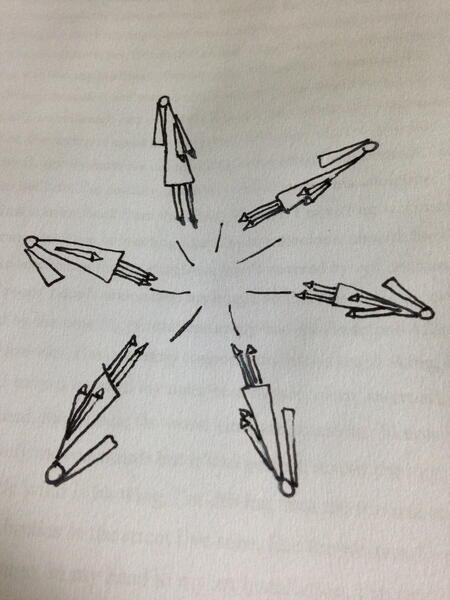 Big BangMore Mrs. Karl's to introduce a couple more from Mrs. Karl's Blog: We are deep in November and I’m canceling appointments left and right. Karl, I say, do me a favor, por favor? Karl knows what’s coming. Go out and get me some treats? I can’t move, I say, to Karl. Since it’s late, the dogs, too, are in fetal positions on our bed. Karl puts on a T-shirt. Karl goes out. Karl comes back. Balances the still-wrapped straw on the lid. Team Wayward, says Karl. Team Problem with Authority. Team Where Do We Go From Here. *** “Good-bye to Shy.” Our local community college is offering the course. Online. I tell Karl we should take it together. That it will help with his business. And that I’ll figure out why I clam up when I’m in a room with others who do what I do. Karl, I say, you can uncover something about the fragile human psyche that’ll make your Karma T-shirts better. People will snap them up. It’ll be simpler. Being who we really are. Karl thinks this is a good idea except he decides it’s enough to follow me around taking notes.
Big BangMore Mrs. Karl's to introduce a couple more from Mrs. Karl's Blog: We are deep in November and I’m canceling appointments left and right. Karl, I say, do me a favor, por favor? Karl knows what’s coming. Go out and get me some treats? I can’t move, I say, to Karl. Since it’s late, the dogs, too, are in fetal positions on our bed. Karl puts on a T-shirt. Karl goes out. Karl comes back. Balances the still-wrapped straw on the lid. Team Wayward, says Karl. Team Problem with Authority. Team Where Do We Go From Here. *** “Good-bye to Shy.” Our local community college is offering the course. Online. I tell Karl we should take it together. That it will help with his business. And that I’ll figure out why I clam up when I’m in a room with others who do what I do. Karl, I say, you can uncover something about the fragile human psyche that’ll make your Karma T-shirts better. People will snap them up. It’ll be simpler. Being who we really are. Karl thinks this is a good idea except he decides it’s enough to follow me around taking notes. -
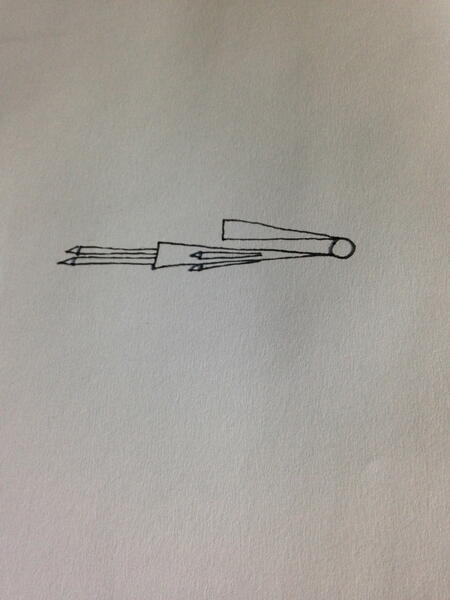 EastAnother: Looking up from my book, I say to Karl, I LOVE Kerouac but we just can’t run around like that. We have to focus. You are just getting this? says Karl. He’s right, but I had been looking for inspiration, knowing, ideas. These days we have to extricate the girls from their rooms. Pry them from their computers. Force-feed them healthy food. While the dogs follow us around, room to room, like beggars, our girls we feel completely outwitted by--what is this horrible adolescence?--did we actually live through it? In the beginning, to us, theirs had something to do with schools. But now that’s all gone vague. Now it’s about survival. Have you eaten? we say. Slept? Then, on the worst days: It’s all going to be okay. Go to your art, we tell the oldest who won’t talk. What are you out of? Paint? Canvas? Film? And stumped, to the youngest, the horse rescuer, we say, Let’s just get you to the farm.
EastAnother: Looking up from my book, I say to Karl, I LOVE Kerouac but we just can’t run around like that. We have to focus. You are just getting this? says Karl. He’s right, but I had been looking for inspiration, knowing, ideas. These days we have to extricate the girls from their rooms. Pry them from their computers. Force-feed them healthy food. While the dogs follow us around, room to room, like beggars, our girls we feel completely outwitted by--what is this horrible adolescence?--did we actually live through it? In the beginning, to us, theirs had something to do with schools. But now that’s all gone vague. Now it’s about survival. Have you eaten? we say. Slept? Then, on the worst days: It’s all going to be okay. Go to your art, we tell the oldest who won’t talk. What are you out of? Paint? Canvas? Film? And stumped, to the youngest, the horse rescuer, we say, Let’s just get you to the farm. -
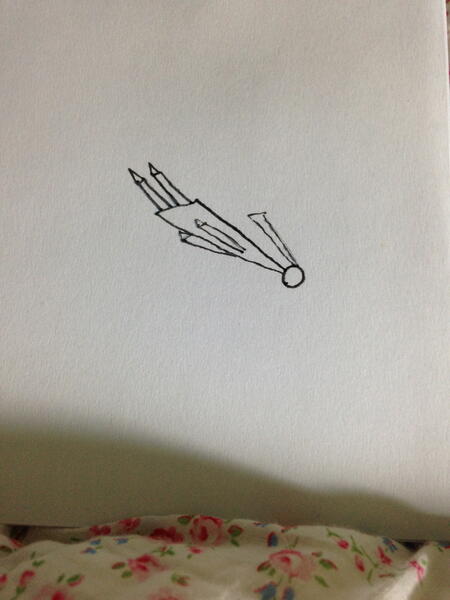 MercyAnd lastly: Karl, I say, I'm going crazy. I have to have a plan. Karl, I say, once when I was little we were taken by our grandmother to a restored theater in downtown St. Joe. We saw a travel film. First the velvet, the hush. And then we were somewhere overseas. An ancient city. Sunlight. Sea. Karl, I say, my father about to leave us, my mother wearily but beautifully making sure we saw his mother. Karl, I say, so much of the film was sky. Karl, I say, I'm at a stoplight and our oldest--I don't even see her get her camera out it's become just another motion of her body--Karl, I say, she wants to see what I cannot see.
MercyAnd lastly: Karl, I say, I'm going crazy. I have to have a plan. Karl, I say, once when I was little we were taken by our grandmother to a restored theater in downtown St. Joe. We saw a travel film. First the velvet, the hush. And then we were somewhere overseas. An ancient city. Sunlight. Sea. Karl, I say, my father about to leave us, my mother wearily but beautifully making sure we saw his mother. Karl, I say, so much of the film was sky. Karl, I say, I'm at a stoplight and our oldest--I don't even see her get her camera out it's become just another motion of her body--Karl, I say, she wants to see what I cannot see. -
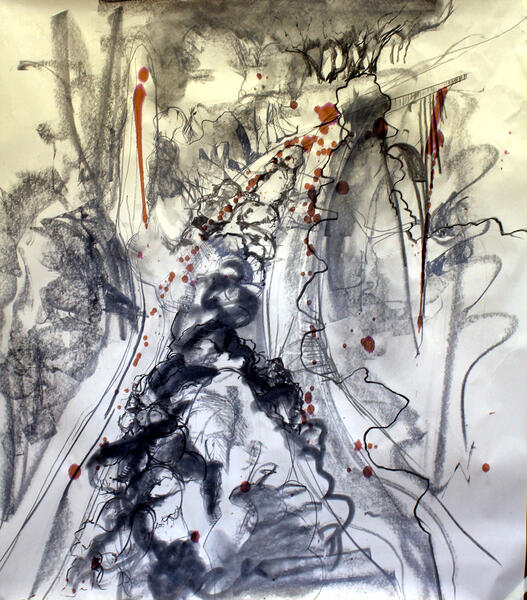 O, captain, my captain,I hope you can see it, zoom in on it, but I see this page I created as a "portal." Around the border I've written, "O, captain, my captain," over and over. The idea is for Ms. Karl to continue flying and fly through it to keep writing/creating.
O, captain, my captain,I hope you can see it, zoom in on it, but I see this page I created as a "portal." Around the border I've written, "O, captain, my captain," over and over. The idea is for Ms. Karl to continue flying and fly through it to keep writing/creating.
Form's Intervention
As a writer, I'm always struggling with finding a form to house the end result of my impulse to write. This picture taken by my aunt (Margot Howard) and my prose poem (?), strung out, on its own, fitting no other group of poems so that it can find it's way into a book, address that, I believe.
-
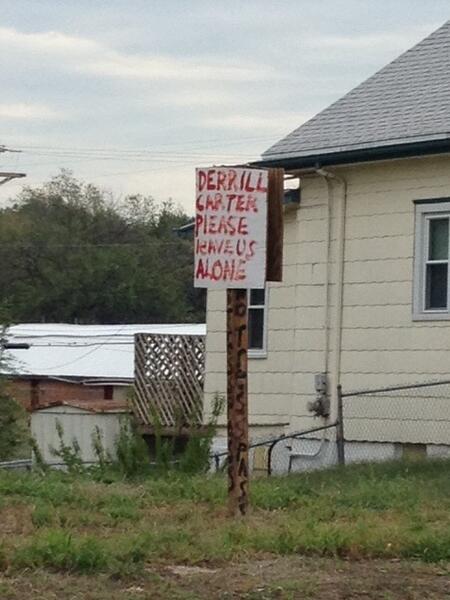 Form's InterventionI chose this picture taken by my aunt (Margot Howard) as she was driving around St. Joseph, MO, our home town, to introduce my poem (next frame) because I think it is heartbreaking and desperate and funny (if you don't laugh, you will cry) in the way that we are often absurd as humans. I love the way "Derrill" is spelled. I love the all-out-at-wit's-end voice of the speaker who made this sign. I love how even the pole of the sign is used as canvas for the speaker's message: "No Tresspassing." "Derrill," it seems, would have To trespass to read the sign. I am a writer exactly like the author of this sign. I am just as desperate. But her piece has found its form: a sign in a yard in the Midwest, my childhood home. My poem about form that I think this picture illustrates is in the next frame.
Form's InterventionI chose this picture taken by my aunt (Margot Howard) as she was driving around St. Joseph, MO, our home town, to introduce my poem (next frame) because I think it is heartbreaking and desperate and funny (if you don't laugh, you will cry) in the way that we are often absurd as humans. I love the way "Derrill" is spelled. I love the all-out-at-wit's-end voice of the speaker who made this sign. I love how even the pole of the sign is used as canvas for the speaker's message: "No Tresspassing." "Derrill," it seems, would have To trespass to read the sign. I am a writer exactly like the author of this sign. I am just as desperate. But her piece has found its form: a sign in a yard in the Midwest, my childhood home. My poem about form that I think this picture illustrates is in the next frame.
My CIA: A Memoir
About My CIA: A Memoir
Book Description:
In her third book, a memoir, Katherine McCord uses the lens of the present to delve into the past: McCord was born in Monrovia, Liberia, Africa, the daughter of a CIA Officer and a beautiful, sheltered, young mother of Irish catholic descent, ten months after the birth of her sister. After a brief stay in Florida, McCord's father would take on his next mission in Katmandu, Nepal. There McCord's mother has a nervous breakdown and the family is secretly flown back to the states where McCord and her sister, fiercely close, would grow up in a "normal" Midwest environment but under and within a shroud of secrecy and propelled by disjointed memories, borrowed histories, and confusing recounts of the past. In My CIA, McCord looks at her life, so far lived with the eyes of a poet, one who knows not how to report and "tell everything" but knows only to tell the truth--of her sorrow, of her hope, of her love and how it finds itself through lyric. In other words, she gives us everything she has to give and finds that the answers are hard won and sometimes in the asking.
Blurbs/Reviews for My CIA:
Katherine McCord's heartbreaking lyric memoir, My CIA, is a fine example of a literary work in which the artist has found the perfect form to contain the content, a shapely vessel to hold shards of memory and loss. Just as the life and identity of a CIA agent (the author's father) is provisional, the persona narrating this story of a family fractured by a mysterious father's absences is a shape-shifter: now knowing, now child-like, now elegiac, now funny, now deeply compassionate and forgiving, and always wise and razor-sharp. Whether McCord is writing about getting on a plane in the middle of the night as a child to go to Nepal or about driving over curbs after a run to the grocery store, talking to her children or mother or sister, or packing up the house to take her family and the dog on vacation in Maine, her voice sings. This memoir is haunting, disturbing, beautiful, and resonant. I could not put it down.
--Natalia Rachel Singer, author of Scraping by in the Big Eighties, a memoir.
You'll want to read My CIA in one go, like I did, greedily, ready for every twist and in-breath that comes from the intricate layers of this expressionist tale. The poetic suspense of My CIA is a bit like Our Man in Havana colliding with Ariel, with deadpan humor and a poetic wit that cuts through the interstices between personal and public history. The family McCord creates, itself a kind of secret agency, operates like a postmodern dollhouse family with the banal-going-on-mysterious behaviors of Mother, Sisters, the Girls and the Father juxtaposed with genuine enigmas. What family espionage is revealed during a conversation between the Sisters where one holds the phone to the washing machine and the other responds, "But you wash everything"? There are hints of underhand influence and Who is the manipulator? floats above the pages making the reader want to investigate anyone's daily reality; but McCord's language is true blue. My CIA is at once smooth and complex, a comedy of manners and ghostly politics played on the stage of the Cold War, anticipating the epilogue of the 21st century. Best enjoyed with a martini, shaken not stirred. --Kathleene West, author of The Summer of the Sub-Comandante and Water Witching
Naming My CIA a top ten book for 2012 and placing it on their ongoing list of Great Nonfiction Books, Sarah Lee Fox of The Review of Arts, Literature, Philosophy and the Humanities wrote, "Ms. McCord is a charming writer, and I was knocked out by my CIA, oops, I mean, MY CIA. There is a mix here of the normal and ordinary life, and the very exotic if now existentially threatening previous life . . . She's a stylist well capable of blending the banal and the scary."
“My CIA is an informative and curious read,” Reviewer's Choice, Midwest Book Review
“PROVOCATIVE,” NEWPAGES.COM
Here is a link to a recording of me reading two poems from the prologue of MY CIA:
http://foggedclarity.com/2009/12/blowback/
What follows are the first pages of the book since I'm unable to get it to upload elsewhere through my page here on the Baker's site.
More Praise for McCord:
"The pared inscription, as well as the delicacy and discretion, of Katherine McCord's debut collection, Island, are always deeply compelling and often breathtaking. The honorable simplicity of this work rewards us time and time again with both wisdom and delight. Quietly elegant, and as intimate as a whisper, this is a book to hold close in the silence of night."
~David St. John, author of The Auroras
"McCord's is a searching poetry, asking questions that have answers too hard to bear."
~Sheila Cowing, author of Jackrabbit Highways
and Stronger in the Broken Places
"Katherine McCord explodes triumphantly onto the poetry scene with her newest collection of prose poems . . . She writes with fevered delicacy. . .and offers us an astounding package. This is the work of a mature, talented writer who integrates her personal amazement at the details of daily life with the inescapable act of being an artist . . . It is deeply compelling work that speaks to the artist's method and madness with delicious effect . . . McCord gives us a year of her life and it is a privilege to experience it through her passionate language."
~Jeanie C. Williams, co-editor of Saludos! Poemas
"Sometimes from dry ground some of the most important and exciting poetry springs. From the saturated reds and greens of New Mexico comes the moving lyric of a life told in poems. Katherine McCord's poems captured me from the first line . . . and carried me through their autobiography in poems. I knew it was a book I had to pay attention to and it's a collection I am proud to have had some small part in bringing to the public. It's the big emptiness of the desert sky crying out to be filled that pulls these lines from the poet's heart. It's a cool cloth on the dying man's brow, the only comfort for miles and the only comfort needed."
~Robert Bixby, author of Come Along
MY CIA
A Memoir
Katherine McCord
Telling Our Stories Press
Showcasing the Art of Literary Personal Narratives
Published by Telling Our Stories Press
The independent literary imprint with a focus on
the art of short memoir and
personal narratives.
Copyright ©2012 by Katherine McCord
All rights reserved
Library of Congress Control Number: 2011933205
No part of this book may be reproduced or transmitted
in any form or by any means, electronic or mechanical, including photocopying, recording, or by any information storage and retrieval system without written permission from the author, except for the inclusion of brief quotations in a review.
Excerpts from Parts I and II appear in South Loop Review, Volume 11,
and are used by permission of the author.
Excerpts from “Blowback” appear in Fogged Clarity, December 2009,
and are used by permission of the author.
Requests for information should be forwarded to
Telling Our Stories Press
visit
www.TellingOurStoriesPress.com
Cover Design by Chris Schramm
Typeset and book layout by Chris Schramm
Printed in the United States of America
ISBN-13: 978-0982922842
ISBN-10: 0982922842
For Tom, Greta and Adi
again and again and again. . . .
and for my mother and my father
and my sister and my brothers
and my brother-in-law and my nieces. . . .
“O, my god,” Sylvia said, “O, my god, what am I / That these late mouths should cry open / In a forest of frost, in a dawn of cornflowers.” --my italics.
---
It seemed there was a room for playing house--
a kitchen, dolls.
And then indecipherable things.
Finally, a heart I made with glue.
The boy across. His head on his folded arms.
Until I can’t take it anymore. And everything,
everything
is a dare. Becomes love.
Explodes into words.
---
Day by day my father flies backwards.
And the pure black dog who was true.
The inside light of winter
and the last few leaves shine through.
Like the book I read with its anguish.
I say, to anyone, it is true.
I tell my students, read it.
It will change you through.
---
Blowback
And where were her people? Spun tight? Deep?
(for Greta and Adi)
“‘Blowback’ is a CIA term first used in March
1954. . . . It is a metaphor for the unintended consequences of the US government’s international activities that have been kept secret from the American people.”
—Chalmers Johnson
---
I write a book for her. Then my sister and I dredge up the past. And after the last kid is sealed inside, we ride to the sound of phones. The house and life before me. The fan fires. The light flickers. An explosion behind the jets in the sky. We call it Sun. From a friend’s we go on a walk. See a house behind hollyhocks swaying in lanes. Fixated, I’m uprooted by my sister’s hand. Come on, she says. I don’t remember ever being so far from home. At the hospital stairs are carpeted like tires. A Coke machine dispenses cups for a quarter. It is our childhood. We race. Choose the best damned one. ?
So I list things. Like where I can no longer go. A series of sagging second-story porches. And how upon waking I see it. That the mirror reflects the truth. Like a bullet hole.
So oblivion’s a mirror. Shame intermingles. How to proceed with the body and heart and soul you’ve been given. Then there are two trees. Red apples. White. Prodigious. Scarce. Separated by a path. The thunk of a prize tumbling down a shaft slow.
And what’s with the shoes? Always upright.
Unlaced. One of two. At the same intersection. All winter. Dispersed. As if some of us are lifted, willing ourselves to stay intact.
My CIA: What I have to tell you is that I don’t know why my father, the CIA, my three trips to a healer, and the Sisters of Bon Secours labyrinth are linked. But they all pulse in my mind with the same uncertainty. Like in the story, A Wrinkle In Time, that I read as a child. At the climax there’s a dais. On the dais is something the main character has to face. It throbs. If I remember right, I think it was the main character herself. Surrounding the dais are members of the main character’s family. Unconscious. Dreaming. Held together by strobes. Anyway, what I know now, about each of these things is that 1. I miss my father terribly and what has replaced him is nothing. But longing and a wanting to understand the mystery behind his existence. So, because of the Freedom of Information Act, I wrote to the CIA and asked them for information about my father’s work for them. What he did in Africa, Nepal, and Vietnam. Maybe to understand him, but more, I think, to find the connection between his past and my present life. 2. Because of health issues, I sought a physical therapist I thought might be a healer too. She describes herself to me as an energy worker. All I know is that she can read my mind. And when she’s working on me, she sees what I see. Without knowing my ability to fly, she says to me when things start to become difficult, Now, don’t start flying. Just as I’m envisioning myself standing on earth, heels up, milliseconds before pushing off. Arms outspread. 3. I don’t know any of the Sisters of Bon Secours. Their website describes the convent’s mission as “to help bring people to wholeness, to alleviate human suffering, and to help bring others to a deeper awareness of their own spirituality.” And that the labyrinth is “a symbolic pilgrimage or journey to the divine.” Coincidentally, my healer’s last name is Devine.
My healer says she is peeling back layers. She says my body is in a state of pensiveness. Bated breath. She says she needs to drain the bad blood. Blood, she adds, that isn’t mine. And just before she says it, I’m looking down into a tunnel where a dark reddish brown liquid flows.
I look up “bad blood” in the dictionary. It is bitterness between persons.
I decide to go to the Sisters of Bon Secours labyrinth. It is just up the road.
On the way home from seeing Bobby, a monumental film set in 1968, the headlights of my husband’s car catch the sign for the Sisters of Bon Secours convent, reminding me to find out how one can visit.
I want my healer to understand without my having to ask. I want her to tell me exactly what I need to do to get on with my life. I want her to tell me whose bitterness I carry.
I’m hoping the letter about my father will come soon, that everything will make sense. Symbols and times and locations. Like 1968, the year of the setting of Bobby. The year I was four. The year my father began his last mission. Each will shine with a resonance beyond my knowing; the knowing will make me whole.
In the meantime, I call the Public Information Line at the CIA asking for a time frame. Sooner rather than later, I get, even though I first contacted them over a year ago, six months after my father died.
***
Book Description:
In her third book, a memoir, Katherine McCord uses the lens of the present to delve into the past: McCord was born in Monrovia, Liberia, Africa, the daughter of a CIA Officer and a beautiful, sheltered, young mother of Irish catholic descent, ten months after the birth of her sister. After a brief stay in Florida, McCord's father would take on his next mission in Katmandu, Nepal. There McCord's mother has a nervous breakdown and the family is secretly flown back to the states where McCord and her sister, fiercely close, would grow up in a "normal" Midwest environment but under and within a shroud of secrecy and propelled by disjointed memories, borrowed histories, and confusing recounts of the past. In My CIA, McCord looks at her life, so far lived with the eyes of a poet, one who knows not how to report and "tell everything" but knows only to tell the truth--of her sorrow, of her hope, of her love and how it finds itself through lyric. In other words, she gives us everything she has to give and finds that the answers are hard won and sometimes in the asking.
Blurbs/Reviews for My CIA:
Katherine McCord's heartbreaking lyric memoir, My CIA, is a fine example of a literary work in which the artist has found the perfect form to contain the content, a shapely vessel to hold shards of memory and loss. Just as the life and identity of a CIA agent (the author's father) is provisional, the persona narrating this story of a family fractured by a mysterious father's absences is a shape-shifter: now knowing, now child-like, now elegiac, now funny, now deeply compassionate and forgiving, and always wise and razor-sharp. Whether McCord is writing about getting on a plane in the middle of the night as a child to go to Nepal or about driving over curbs after a run to the grocery store, talking to her children or mother or sister, or packing up the house to take her family and the dog on vacation in Maine, her voice sings. This memoir is haunting, disturbing, beautiful, and resonant. I could not put it down.
--Natalia Rachel Singer, author of Scraping by in the Big Eighties, a memoir.
You'll want to read My CIA in one go, like I did, greedily, ready for every twist and in-breath that comes from the intricate layers of this expressionist tale. The poetic suspense of My CIA is a bit like Our Man in Havana colliding with Ariel, with deadpan humor and a poetic wit that cuts through the interstices between personal and public history. The family McCord creates, itself a kind of secret agency, operates like a postmodern dollhouse family with the banal-going-on-mysterious behaviors of Mother, Sisters, the Girls and the Father juxtaposed with genuine enigmas. What family espionage is revealed during a conversation between the Sisters where one holds the phone to the washing machine and the other responds, "But you wash everything"? There are hints of underhand influence and Who is the manipulator? floats above the pages making the reader want to investigate anyone's daily reality; but McCord's language is true blue. My CIA is at once smooth and complex, a comedy of manners and ghostly politics played on the stage of the Cold War, anticipating the epilogue of the 21st century. Best enjoyed with a martini, shaken not stirred. --Kathleene West, author of The Summer of the Sub-Comandante and Water Witching
Naming My CIA a top ten book for 2012 and placing it on their ongoing list of Great Nonfiction Books, Sarah Lee Fox of The Review of Arts, Literature, Philosophy and the Humanities wrote, "Ms. McCord is a charming writer, and I was knocked out by my CIA, oops, I mean, MY CIA. There is a mix here of the normal and ordinary life, and the very exotic if now existentially threatening previous life . . . She's a stylist well capable of blending the banal and the scary."
“My CIA is an informative and curious read,” Reviewer's Choice, Midwest Book Review
“PROVOCATIVE,” NEWPAGES.COM
Here is a link to a recording of me reading two poems from the prologue of MY CIA:
http://foggedclarity.com/2009/12/blowback/
What follows are the first pages of the book since I'm unable to get it to upload elsewhere through my page here on the Baker's site.
More Praise for McCord:
"The pared inscription, as well as the delicacy and discretion, of Katherine McCord's debut collection, Island, are always deeply compelling and often breathtaking. The honorable simplicity of this work rewards us time and time again with both wisdom and delight. Quietly elegant, and as intimate as a whisper, this is a book to hold close in the silence of night."
~David St. John, author of The Auroras
"McCord's is a searching poetry, asking questions that have answers too hard to bear."
~Sheila Cowing, author of Jackrabbit Highways
and Stronger in the Broken Places
"Katherine McCord explodes triumphantly onto the poetry scene with her newest collection of prose poems . . . She writes with fevered delicacy. . .and offers us an astounding package. This is the work of a mature, talented writer who integrates her personal amazement at the details of daily life with the inescapable act of being an artist . . . It is deeply compelling work that speaks to the artist's method and madness with delicious effect . . . McCord gives us a year of her life and it is a privilege to experience it through her passionate language."
~Jeanie C. Williams, co-editor of Saludos! Poemas
"Sometimes from dry ground some of the most important and exciting poetry springs. From the saturated reds and greens of New Mexico comes the moving lyric of a life told in poems. Katherine McCord's poems captured me from the first line . . . and carried me through their autobiography in poems. I knew it was a book I had to pay attention to and it's a collection I am proud to have had some small part in bringing to the public. It's the big emptiness of the desert sky crying out to be filled that pulls these lines from the poet's heart. It's a cool cloth on the dying man's brow, the only comfort for miles and the only comfort needed."
~Robert Bixby, author of Come Along
MY CIA
A Memoir
Katherine McCord
Telling Our Stories Press
Showcasing the Art of Literary Personal Narratives
Published by Telling Our Stories Press
The independent literary imprint with a focus on
the art of short memoir and
personal narratives.
Copyright ©2012 by Katherine McCord
All rights reserved
Library of Congress Control Number: 2011933205
No part of this book may be reproduced or transmitted
in any form or by any means, electronic or mechanical, including photocopying, recording, or by any information storage and retrieval system without written permission from the author, except for the inclusion of brief quotations in a review.
Excerpts from Parts I and II appear in South Loop Review, Volume 11,
and are used by permission of the author.
Excerpts from “Blowback” appear in Fogged Clarity, December 2009,
and are used by permission of the author.
Requests for information should be forwarded to
Telling Our Stories Press
visit
www.TellingOurStoriesPress.com
Cover Design by Chris Schramm
Typeset and book layout by Chris Schramm
Printed in the United States of America
ISBN-13: 978-0982922842
ISBN-10: 0982922842
For Tom, Greta and Adi
again and again and again. . . .
and for my mother and my father
and my sister and my brothers
and my brother-in-law and my nieces. . . .
“O, my god,” Sylvia said, “O, my god, what am I / That these late mouths should cry open / In a forest of frost, in a dawn of cornflowers.” --my italics.
---
It seemed there was a room for playing house--
a kitchen, dolls.
And then indecipherable things.
Finally, a heart I made with glue.
The boy across. His head on his folded arms.
Until I can’t take it anymore. And everything,
everything
is a dare. Becomes love.
Explodes into words.
---
Day by day my father flies backwards.
And the pure black dog who was true.
The inside light of winter
and the last few leaves shine through.
Like the book I read with its anguish.
I say, to anyone, it is true.
I tell my students, read it.
It will change you through.
---
Blowback
And where were her people? Spun tight? Deep?
(for Greta and Adi)
“‘Blowback’ is a CIA term first used in March
1954. . . . It is a metaphor for the unintended consequences of the US government’s international activities that have been kept secret from the American people.”
—Chalmers Johnson
---
I write a book for her. Then my sister and I dredge up the past. And after the last kid is sealed inside, we ride to the sound of phones. The house and life before me. The fan fires. The light flickers. An explosion behind the jets in the sky. We call it Sun. From a friend’s we go on a walk. See a house behind hollyhocks swaying in lanes. Fixated, I’m uprooted by my sister’s hand. Come on, she says. I don’t remember ever being so far from home. At the hospital stairs are carpeted like tires. A Coke machine dispenses cups for a quarter. It is our childhood. We race. Choose the best damned one. ?
So I list things. Like where I can no longer go. A series of sagging second-story porches. And how upon waking I see it. That the mirror reflects the truth. Like a bullet hole.
So oblivion’s a mirror. Shame intermingles. How to proceed with the body and heart and soul you’ve been given. Then there are two trees. Red apples. White. Prodigious. Scarce. Separated by a path. The thunk of a prize tumbling down a shaft slow.
And what’s with the shoes? Always upright.
Unlaced. One of two. At the same intersection. All winter. Dispersed. As if some of us are lifted, willing ourselves to stay intact.
My CIA: What I have to tell you is that I don’t know why my father, the CIA, my three trips to a healer, and the Sisters of Bon Secours labyrinth are linked. But they all pulse in my mind with the same uncertainty. Like in the story, A Wrinkle In Time, that I read as a child. At the climax there’s a dais. On the dais is something the main character has to face. It throbs. If I remember right, I think it was the main character herself. Surrounding the dais are members of the main character’s family. Unconscious. Dreaming. Held together by strobes. Anyway, what I know now, about each of these things is that 1. I miss my father terribly and what has replaced him is nothing. But longing and a wanting to understand the mystery behind his existence. So, because of the Freedom of Information Act, I wrote to the CIA and asked them for information about my father’s work for them. What he did in Africa, Nepal, and Vietnam. Maybe to understand him, but more, I think, to find the connection between his past and my present life. 2. Because of health issues, I sought a physical therapist I thought might be a healer too. She describes herself to me as an energy worker. All I know is that she can read my mind. And when she’s working on me, she sees what I see. Without knowing my ability to fly, she says to me when things start to become difficult, Now, don’t start flying. Just as I’m envisioning myself standing on earth, heels up, milliseconds before pushing off. Arms outspread. 3. I don’t know any of the Sisters of Bon Secours. Their website describes the convent’s mission as “to help bring people to wholeness, to alleviate human suffering, and to help bring others to a deeper awareness of their own spirituality.” And that the labyrinth is “a symbolic pilgrimage or journey to the divine.” Coincidentally, my healer’s last name is Devine.
My healer says she is peeling back layers. She says my body is in a state of pensiveness. Bated breath. She says she needs to drain the bad blood. Blood, she adds, that isn’t mine. And just before she says it, I’m looking down into a tunnel where a dark reddish brown liquid flows.
I look up “bad blood” in the dictionary. It is bitterness between persons.
I decide to go to the Sisters of Bon Secours labyrinth. It is just up the road.
On the way home from seeing Bobby, a monumental film set in 1968, the headlights of my husband’s car catch the sign for the Sisters of Bon Secours convent, reminding me to find out how one can visit.
I want my healer to understand without my having to ask. I want her to tell me exactly what I need to do to get on with my life. I want her to tell me whose bitterness I carry.
I’m hoping the letter about my father will come soon, that everything will make sense. Symbols and times and locations. Like 1968, the year of the setting of Bobby. The year I was four. The year my father began his last mission. Each will shine with a resonance beyond my knowing; the knowing will make me whole.
In the meantime, I call the Public Information Line at the CIA asking for a time frame. Sooner rather than later, I get, even though I first contacted them over a year ago, six months after my father died.
***
-
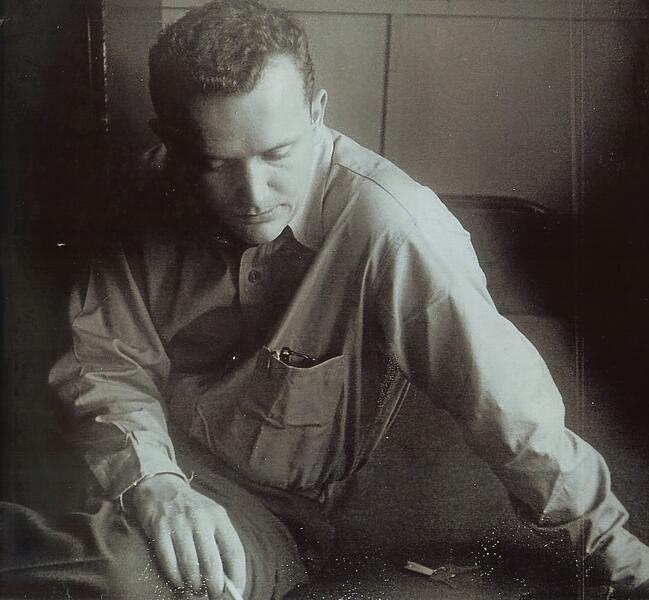 DadThis is a picture of my dad, a couple years before I was born, probably during the time he joined the CIA. His decision of course will change the entire course of our family, my birth, my lens for life, all that I write about in MY CIA: A MEMOIR. Here is a link to audio of an interview I did about the book on Aaron Henkin's wonderful show, THE SIGNAL (Baltimore, WYPR, 88.1): http://wypr.org/post/signal-13114.
DadThis is a picture of my dad, a couple years before I was born, probably during the time he joined the CIA. His decision of course will change the entire course of our family, my birth, my lens for life, all that I write about in MY CIA: A MEMOIR. Here is a link to audio of an interview I did about the book on Aaron Henkin's wonderful show, THE SIGNAL (Baltimore, WYPR, 88.1): http://wypr.org/post/signal-13114. -
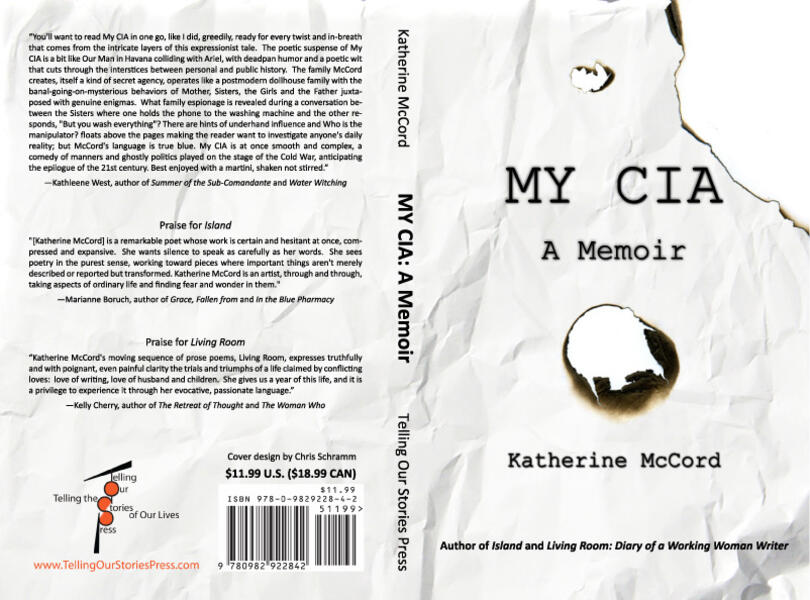 Front Cover and a Little MoreThis is a shot of the front, back and spine of MY CIA: A MEMOIR. It's a nontraditional memoir. While creative nonfiction, it is a lyric essay, hovering over the line between poetry and prose, therefore embracing both.
Front Cover and a Little MoreThis is a shot of the front, back and spine of MY CIA: A MEMOIR. It's a nontraditional memoir. While creative nonfiction, it is a lyric essay, hovering over the line between poetry and prose, therefore embracing both.
Gatekeeper
This is new work. I'm seeing where it is headed. Given that, I can't shake these poems that will follow. They are introducing something I have yet to "know." I keep writing, but other than these poems and a few other prose pieces that all link, I'm throwing a lot away. Here they are
Spring Explains
The blooms were
falling over themselves, dropping,
tangled, spoken,
loud, elegant, nothing. Away
---
The desert, on the other hand, was sometimes
a line, a loop, a swirl.
---
At the opening, among the paintings and poems, are a wine glass, a couple exiting, some scattered programs and pamphlets, a huge arrangement of flowers.
I am the last one in.
What accompanies me is sideways rain. Two gridlocked beltways, anguish, my inability to see well in the dark. And there is a lot of dark.
Then I think of my husband singing. Like aftermath. The voice rising up.
--Katherine McCord
Here is a link to one of the other opening pieces for Gatekeeper. It was published recently in PLATH PROFILES:
http://www.iun.edu/%7enwadmin/plath/vol5/Poetry_McCord.pdf
Spring Explains
The blooms were
falling over themselves, dropping,
tangled, spoken,
loud, elegant, nothing. Away
---
The desert, on the other hand, was sometimes
a line, a loop, a swirl.
---
At the opening, among the paintings and poems, are a wine glass, a couple exiting, some scattered programs and pamphlets, a huge arrangement of flowers.
I am the last one in.
What accompanies me is sideways rain. Two gridlocked beltways, anguish, my inability to see well in the dark. And there is a lot of dark.
Then I think of my husband singing. Like aftermath. The voice rising up.
--Katherine McCord
Here is a link to one of the other opening pieces for Gatekeeper. It was published recently in PLATH PROFILES:
http://www.iun.edu/%7enwadmin/plath/vol5/Poetry_McCord.pdf
-
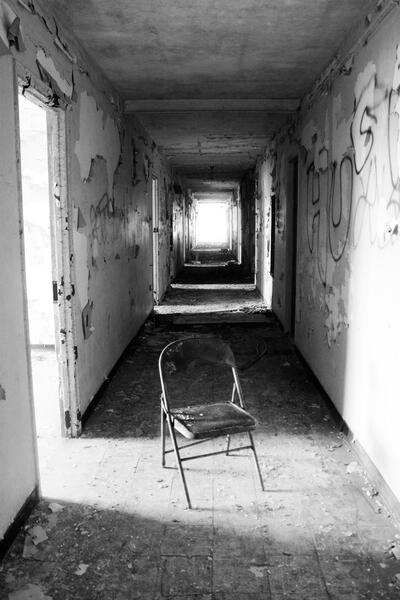 Spring ExplainsThis picture, taken by my daughter, an amazing photographer, is the "cover" here of my new work, Gatekeeper.
Spring ExplainsThis picture, taken by my daughter, an amazing photographer, is the "cover" here of my new work, Gatekeeper. -
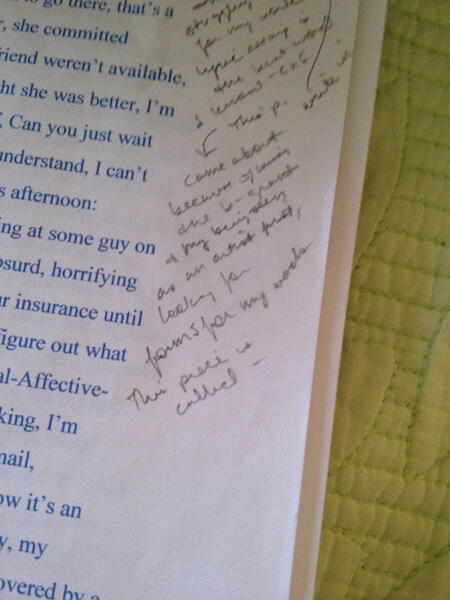 Memoir MercyThis picture is of the manuscript I read in the next box/frame (to the right of this one, the one with the film reel on it :) here; it is also of Gatekeeper. The writing on the manuscript in the picture introduces the video. Click on the video icon in the next box/frame to see me reading it.
Memoir MercyThis picture is of the manuscript I read in the next box/frame (to the right of this one, the one with the film reel on it :) here; it is also of Gatekeeper. The writing on the manuscript in the picture introduces the video. Click on the video icon in the next box/frame to see me reading it. -
Memoir MercyThis is the poem introduced by the last photograph. I like how part of the picture is cut off and almost half is not white but black space; it emphasizes perspective to me. Your perspective, while maybe different from someone else's, is still true. And I want to honor that. :)

